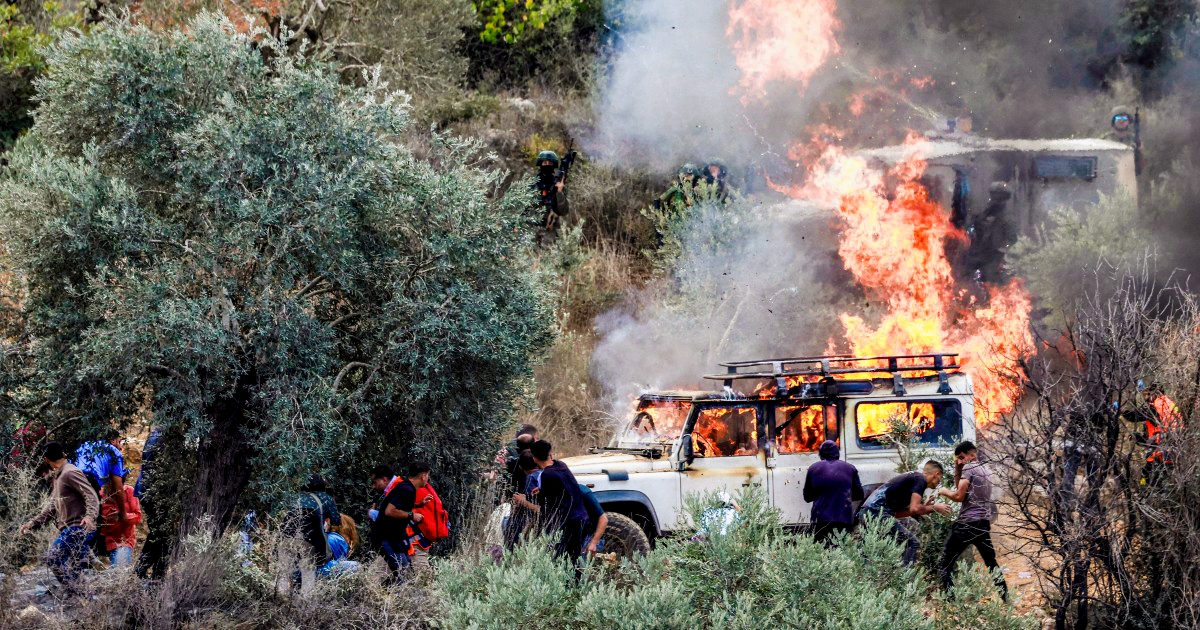Israeli settlers attack West Bank farmers and ignite the olive season

While the olive picking season in Palestine is supposed to be an occasion for livelihood and joy, it has once again turned into a scene of violence and tension, with an increase in attacks by Israeli settlers against Palestinian farmers in various parts of the West Bank, amid official Israeli silence and renewed Palestinian calls for international protection.
* Simultaneous attacks in the North and South: Injuries, fires, and vandalism
On Sunday morning, farmers from the village of Turmusaya north of Ramallah were attacked by a group of settlers, resulting in one farmer being injured, in addition to setting fire to several vehicles.
In the south, in the town of Sawiya near Nablus, settlers attacked olive pickers and set fire to their cars during an assault that took place between the villages of Al-Mughayer and Turmusaya.
In Bethlehem, one of the settlers' shepherds invaded citizens' lands in the Khalayel Al-Waz area south of the city, leaving his flock to destroy agricultural crops, causing severe damage to the plants.
The attacks did not stop there, as local sources in the northern West Bank reported that a bulldozer belonging to the settlers began land leveling operations in agricultural lands between the villages of Burqa and Beit Imerin, an area that has witnessed repeated attempts at settlement expansion for years.
* Seasonal attacks repeat without accountability
Palestinian and Israeli human rights reports indicate that these attacks have become a recurring seasonal pattern, especially with farmers being preoccupied during the olive season, where settlers do the following:
• Cut down trees
• Steal olive fruits
• Burn properties
• Physically assault farmers
According to the Israeli human rights organization B'Tselem, more than 400 attacks on Palestinian farmers were documented during the past two olive seasons, most of them in the governorates of Nablus, Ramallah, Salfit, and Jenin, which are areas densely surrounded by settlements and outposts.
* The olive tree ... from a symbol of peace to a target for attacks
The olive tree has long been a symbol of peace, roots, and resilience in Palestinian culture,
however, it has become a direct target in this conflict.
Data from the Palestinian Ministry of Agriculture indicates:
• More than 2.5 million olive trees have been uprooted or burned since 2000.
• Annual losses exceed 20 million dollars due to attacks, including crop loss and destruction of agricultural infrastructure.
* A season under threat ... and livelihood in jeopardy
Olives are a cornerstone of the Palestinian rural economy, with around 80 thousand farmers relying on them as a primary source of income.
Estimates indicate that the West Bank produces about 10 thousand tons of olive oil annually, a large portion of which is allocated for export.
However, this season, which is supposed to be a season of livelihood and family cooperation, has become fraught with dangers, especially in villages adjacent to settlements, where farmers are sometimes prevented from accessing their lands except with coordination with the Israeli army.
Local farmers confirmed that the attacks have become not just seasonal events, but have turned into a "systematic policy" aimed at pushing them to abandon their lands through intimidation and deliberate vandalism.
* Calls for international protection and deterrence of aggressors
Amid this escalation, Palestinian and Israeli organizations renewed their calls for the international community to intervene to stop these attacks.
The Palestinian Ministry of Foreign Affairs called on the United Nations and the European Union to:
• Bear their legal and humanitarian responsibilities
• Provide international protection for farmers and civilians
• Hold the aggressors accountable and stop impunity
The ministry confirmed that the continuation of these violations "undermines the chances of stability in the region and threatens the entire agricultural process".
For its part, Israeli organizations opposing settlement such as "Peace Now" expressed their deep concern over the escalation of settler violence and the decline of governmental deterrence against them.
* Despite the threats ... farmers continue to harvest
Despite the daily threats, Palestinian farmers insist on harvesting their crops and protecting their lands, affirming that the olive tree for them is more than a source of livelihood;
it is a symbol of belonging, history, and resilience.
In the face of fires, leveling, and bullets, the olive tree remains tall, a witness to a daily battle between the landowners and those who seek to seize it.